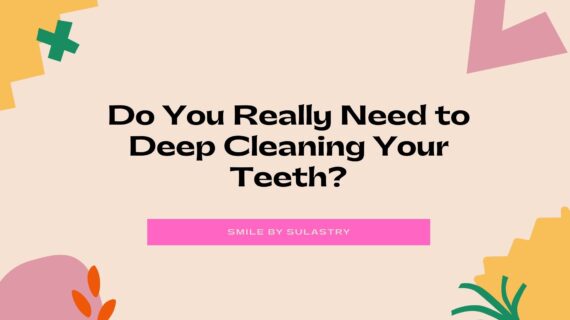Deep teeth cleaning is a preventive measure taken by a dentist or dental hygienist. It’s to maintain or achieve maximum your oral health. Here, the dentist will remove plaque and tartar that has accumulated on your teeth to protect your teeth. It’s can protect you from cavities, dental caries, and gum disorders.
Usual teeth cleaning can be done at home with a toothbrush, toothpaste, and dental floss. But, everyone still needs a deeper and more thorough dental cleaning that only a dentist can do. This is because cleaning your teeth with a toothbrush and dental floss cannot remove all the plaque. You need to clear tartar that tends to stick to the surface of your teeth.
Also Read Beautiful teeth give you a charming smile
Who needs deep teeth cleaning?
Everyone is advised to undergo dental cleanings at least once every six months to prevent dental problems. If you are already affected by oral disorders or diseases, cleaning your teeth should be done more often.
Dental cleaning, or also known as prophylaxis, is done by removing plaque or mineral tartar deposits on the tooth surface. This is to prevent dental problems that can be caused by these dirt deposits when left alone. Dirt deposits can still arise even though you have cleaned your teeth with a toothbrush or dental floss carefully and regularly. Brushing your teeth regularly may slow down the process of plaque build-up but can’t stop it.
Plaque is a smooth, sticky layer that has become infected with bacteria. Long-term accumulation of plaque can cause cavities in your teeth and eventually your teeth become damaged. While tartar in the form of hard calcium that settles on your teeth.
The deposition process is the same as white crust that settles on a water pipe. Tartar has the same color as the teeth, so it is difficult for some people to see, you may also find it difficult to see. However, there is also tartar that is brown or black. If tartar is not cleaned, the teeth will become a fertile growth place for bacteria. With a professional deep cleaning, the surface of the teeth will be clean and smooth, making it difficult for bacteria to stick to the teeth.
The goals of having a professional deep cleaning on a regular basis for your teeth:
- Prevent cavities
- Maintain oral health
- Prevents tooth and gum disease
- Prevents a lot of tartar from forming
- Cleans stains on the surface of the teeth
How deep teeth cleaning works
You can try to do a deep cleaning of your teeth. Professional deep teeth cleaning can be done by a dentist or dental hygienist. This action is performed by three cleaning techniques:
- Tartar cleaning – Tartar cleaning is the process of cleaning the membranes or layers of substances that settle on the surface of the teeth.
- Teeth polishing – Performed after tartar cleaning, tooth polishing is the process of smoothing the surface of the teeth.
- Debridement – Debridement is done when the tartar is too much and cannot be removed by cleaning the tartar. When using this technique, the dental hygienist will use a variety of dental tools to loosen and remove tartar.
The following tools or devices for deep teeth cleaning
- Ultrasonic appliance – An ultrasonic device is a device that uses gentle vibrations to slowly but effectively loosen large tartar. At the same time, it sprays cold air to remove small tartar that has fallen off. When the large tartar has been removed, the dentist will usually replace the ultrasonic device with another, smaller handheld device.
- Scaler or curette – This is a smaller, handheld device that dentists use to remove smaller debris deposits. This tool is very effective for cleaning tartar and plaque.
- Polisher – This tool is a hand tool with a soft rubber tip that is moved slowly to polish the tooth surface.
- Fluorine – Dentists may also apply a small amount of fluoride during tooth cleaning. Fluorine is available in foam or gel form and can help strengthen teeth to protect them from the harmful effects of plaque and tartar. After fluoride is applied to the teeth, patients are advised not to eat, drink or rinse their mouth for at least 30 minutes.
Conclusion
If you need a deep cleaning, this is not a rare occurrence. People around you may be suffering from gum disease. The fact that you address the problem makes a huge difference to your future dental health. As with most health conditions, the earlier the problem is addressed and treated, the better the outcome is likely to be.
References
- https://www.docdoc.com/id/info/procedure/pembersihan-gigi
- https://www.myidealdental.com/blog/do-i-really-need-a-deep-cleaning/
- https://www.braseltonsmilestudio.com/blog/a-dentist-recommended-a-deep-cleaning-do-i-really-need-it
- https://www.vice.com/en/article/wjgnxb/is-a-dental-deep-cleaning-ever-really-necessary



